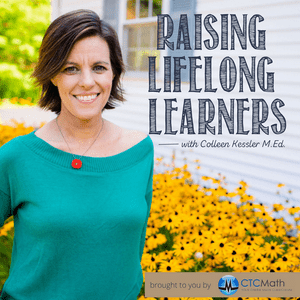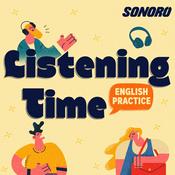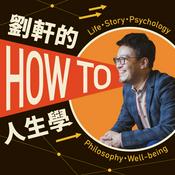292 episodes

Navigating the Holidays with Intense and Sensitive Kids
17/12/2025 | 43 mins.
As the holidays approach, many families experience a swirl of excitement, chaos, and sometimes overwhelm. On the latest episode of the podcast, we dive deep into the realities of parenting and homeschooling neurodivergent kids during this season—and share practical strategies to help everyone thrive (not just survive). Here are 3 key takeaways for parents and educators supporting neurodiverse learners over the holidays: Proactive Planning is Essential: From bringing favorite snacks and engaging activities to prepping for early exits from gatherings, thinking ahead can make all the difference for kids who struggle with disrupted schedules and sensory overload. Let Go of Others' Expectations: Remember that it's okay if our holiday experience looks different than others'. Prioritizing your child's needs over others' opinions is a powerful way to support both your child and your own well-being. Teamwork Makes the Season Brighter: Getting on the same page with your spouse, older siblings, and even relatives about plans, support, and backup strategies can help everyone feel included and respected during festivities. If you need more resources, ideas, or just reassurance that you're not alone on this journey, check out the links below for valuable tips, printable activities, and additional support! Let's embrace the season—intensity and all—and build meaningful, positive memories together. Links and Resources from Today's Episode Thank you to our sponsors: CTC Math – Flexible, affordable math for the whole family! Curiosity Post – A Snail Mail Club for kids – Coming in 2026! The Lab: An Online Community for Families Homeschooling Neurodivergent Kiddos The Homeschool Advantage: A Child-Focused Approach to Raising Lifelong Learners Raising Resilient Sons: A Boy Mom's Guide to Building a Strong, Confident, and Emotionally Intelligent Family The Anxiety Toolkit Sensory Strategy Toolkit | Quick Regulation Activities for Home Affirmation Cards for Anxious Kids Holiday Light Scavenger Hunt: A Sensory-Friendly Family Tradition for Homeschoolers A Calm, Fun Holiday Activity for Neurodivergent Kids: Free Christmas Charades Printable Holiday Homeschooling Made Easier: Santa & Reindeer Emotions Spinner Free Printable Managing the Holidays with Sensory Kids with Sarah Collins Gratitude For The Holidays: Why It Is So Helpful For Neurodiverse Kids Intense Children and The Holidays: A Parent's Guide RLL 33: The Holidays and Your Differently-Wired Child Autism and the Holidays | Julie's School Performance Story The Holidays and Your Intense Child Christmas Learning Through Play: Free Scattergories Game for Kids Family Favorite Christmas Books Hands-On Christmas Fun: Free Chatterbox Printable for Homeschoolers Fun and Easy Christmas Tic Tac Toe Printable for Your Homeschool Christmas Slime Science Activity Easy Little Girl Christmas Hairstyles

Picky Eating | Sensory Struggles and Real Solutions for Homeschooling Families
15/12/2025 | 44 mins.
If mealtimes sometimes feel more like hostage negotiations than family gatherings – you're not alone! In our latest episode of the podcast, we explore the sensory reasons behind picky eating, especially for neurodivergent kids, and share practical strategies to make the table a calmer, more positive space. Highlights from this episode: Understanding the Why: Picky eating isn't just stubbornness. It often stems from sensory sensitivities, past negative experiences, or a need for predictability. Kids aren't being difficult—their bodies are protecting them. Red Flags to Watch For: If your child shows signs of weight loss, growth issues, drops food categories, or frequently gags or chokes, it's time to seek professional help. Remember: asking for support is a win, not a failure! No Pressure Plate System: You choose what, when, and where food is served; your child chooses if and how much to eat. Offer two to three safe foods and one or two "learning foods" for gentle exposure, plus a "no thank you bowl" for stress-free refusals. Calm Bodies First: Try a 2–3 minute pre-meal routine—wall push-ups, sipping water through a straw, sitting with good posture—to help kids feel regulated and ready to eat. Food Chaining & Texture Ladders: Move from safe favorites to new foods in baby steps, adjusting one property (size, shape, temperature) at a time. Celebrate curiosity and every little try! Making Meals Manageable: Deconstruct dishes, keep sensory overload low (dim lights, reduce kitchen noise), and offer dips or fun utensils to encourage engagement. Handling Family Gatherings: Stand your ground! Share your approach if you're questioned, and remember—you know your child best. You're doing great—trust yourself, take baby steps, and remember our podcast is here to support you every week. If you found this episode helpful, please share with friends or leave a review on your favorite podcast app! Links and Resources from Today's Episode Thank you to our sponsors: CTC Math – Flexible, affordable math for the whole family! Curiosity Post – A Snail Mail Club for kids – Coming in 2026! The Lab: An Online Community for Families Homeschooling Neurodivergent Kiddos The Homeschool Advantage: A Child-Focused Approach to Raising Lifelong Learners Raising Resilient Sons: A Boy Mom's Guide to Building a Strong, Confident, and Emotionally Intelligent Family The Anxiety Toolkit Sensory Strategy Toolkit | Quick Regulation Activities for Home Affirmation Cards for Anxious Kids Sensory Struggles and Clothes: How to Help Your Child Dress Without Tears Navigating Sensory Overload: Actionable Strategies for Kids in Loud Environments Building a Sensory Diet Toolbox for Neurodivergent Kids at Home Playful Sensory Learning at Home: Five Senses Spinner Managing the Holidays with Sensory Kids with Sarah Collins Self-Care and Co-Regulation | Balancing Parenting and Sensory Needs Respecting Your Child's Sensory Needs: When You Have to Say "No" Sensory Science Activity: Perfect For Your Homeschool Embracing Art and Its History for Kids With Sensory Issues Yard Work for Sensory Input Pumpkin Play Dough | Sensory Fun for Kids Sensory Play with Spice Painting Sensory Play for Kids Games and Conversation Tools for the Dinner Table

Movement on Bad Weather Days: Meeting Sensory Needs at Home
05/12/2025 | 40 mins.
Icky Weather can throw off routines, especially for differently wired kiddos with sensory needs. When outdoor time isn't an option, you might notice more fidgeting, zoning out, or struggles with focus. But don't worry—in this episode of the podcast, you'll find simple, creative ideas to feed those movement needs, helping kids regulate and transition smoothly to academics or other activities. Here's a peek at what you'll find: Quick Home Sensory Zone: Learn how to set up a safe, 5x5 space using cushions, painter's tape, and a crash pad—no fancy equipment necessary! Heavy Work Menu: Wall push-ups, laundry basket hauls, chair pushbacks, and animal walks—no gear needed. These activities organize and calm kids for improved focus. Vestibular Activities: (Use with care!) Rocking chairs, log rolls, balance lines, and jump zones—all for short bursts to get brains and bodies alert. Movement Circuits: Build easy three-station circuits for calm, wake-up, or after-lunch resets. Each circuit is two minutes of activity + one minute of water break. Rotate and customize as needed! Fun & Games: Turn movement into play with "heavy work floor is lava," hallway sled races, sock match dashes, and fitness card flips. Bonus Toolkit Alert! Check out the brand new Sensory Strategy Toolkit in our shop—a printable deck of activity cards sorted by sensory need. Perfect for quick reference, planning, and keeping kids engaged! Why Movement Matters Kids who get enough heavy work are more likely to be calm, organized, and ready to learn. Sensory-informed movement routines aren't just for rainy days—they help anytime you need a transition or reset. Let kids choose activities, set visual timers, and check their "green, yellow, red" body readiness zones to build self-awareness. Support the Show Subscribe, leave a rating, and share this episode with anyone who could use a little sensory inspiration. Enjoy your week, love on your kids, and let movement work its magic—even if the rain won't stop! Links and Resources from Today's Episode Thank you to our sponsors: CTC Math – Flexible, affordable math for the whole family! Curiosity Post - A Snail Mail Club for kids - Coming in 2026! The Lab: An Online Community for Families Homeschooling Neurodivergent Kiddos The Homeschool Advantage: A Child-Focused Approach to Raising Lifelong Learners Raising Resilient Sons: A Boy Mom's Guide to Building a Strong, Confident, and Emotionally Intelligent Family The Anxiety Toolkit Sensory Strategy Toolkit | Quick Regulation Activities for Home Affirmation Cards for Anxious Kids Sensory Struggles and Clothes: How to Help Your Child Dress Without Tears Navigating Sensory Overload: Actionable Strategies for Kids in Loud Environments Building a Sensory Diet Toolbox for Neurodivergent Kids at Home Playful Sensory Learning at Home: Five Senses Spinner Managing the Holidays with Sensory Kids with Sarah Collins Self-Care and Co-Regulation | Balancing Parenting and Sensory Needs Respecting Your Child's Sensory Needs: When You Have to Say "No" Sensory Science Activity: Perfect For Your Homeschool Embracing Art and Its History for Kids With Sensory Issues Yard Work for Sensory Input Pumpkin Play Dough | Sensory Fun for Kids Sensory Play with Spice Painting Sensory Play for Kids

Sensory Struggles and Clothes: How to Help Your Child Dress Without Tears
12/11/2025 | 52 mins.
We know mornings can feel like a battlefield when sensory issues and clothing collide, leaving kids (and parents!) frustrated before the day even begins. That's why this week's podcast episode dives into the heart of sensory struggles with clothes. Colleen has packed this episode with real-life advice for families navigating tactile sensitivities. If getting dressed feels like wrestling a porcupine, you're not alone—and you're not failing! Sensory struggles are REAL signals from your child's nervous system. Sometimes clothes feel prickly, itchy, or unexpectedly uncomfortable and it can lead to meltdowns. The triggers are diverse: tactile defensiveness, unpredictability (new tags or seams), anxiety, or simply needing more control over their experiences. Comfort First: Building a Supportive Wardrobe Colleen encourages a "comfort audit" this week: set aside 10–15 minutes with your child and sort clothing into keeps, maybes, and no ways. Let your child lead—by touch, feel, or trying on—and honor their decisions. Once you have your "green light" pieces, build a 3–5 piece comfort capsule wardrobe: fewer choices mean less morning stress. You've got this! Links and Resources from Today's Episode Thank you to our sponsor: CTC Math – Flexible, affordable math for the whole family! The Lab: An Online Community for Families Homeschooling Neurodivergent Kiddos The Homeschool Advantage: A Child-Focused Approach to Raising Lifelong Learners Raising Resilient Sons: A Boy Mom's Guide to Building a Strong, Confident, and Emotionally Intelligent Family The Anxiety Toolkit Navigating Sensory Overload: Actionable Strategies for Kids in Loud Environments Building a Sensory Diet Toolbox for Neurodivergent Kids at Home Playful Sensory Learning at Home: Five Senses Spinner Managing the Holidays with Sensory Kids with Sarah Collins Self-Care and Co-Regulation | Balancing Parenting and Sensory Needs Respecting Your Child's Sensory Needs: When You Have to Say "No" Sensory Science Activity: Perfect For Your Homeschool Embracing Art and Its History for Kids With Sensory Issues Yard Work for Sensory Input Pumpkin Play Dough | Sensory Fun for Kids Sensory Play with Spice Painting Sensory Play for Kids

Navigating Sensory Overload: Actionable Strategies for Kids in Loud Environments
30/10/2025 | 59 mins.
This episode continues our sensory series, diving deep into the world of Sensory Sound, with actionable strategies for supporting sensitive kids wherever you go. Why Are Loud Spaces So Overwhelming? Colleen unpacks how unpredictable peaks in sound, bustling crowds, harsh lighting, and layered sensory inputs can overload sensitive nervous systems. Whether it's a mic popping at announcements, the hum of the HVAC, or the swirl of cafeteria chatter—these environments can quickly become "too much." Building a Predictable Noise Plan—Step by Step This episode is all about taking back control and creating a kind, doable plan so your kids can participate and feel safe: Recon the Space: Visit venues early, spot the quiet zones, locate exits, and identify problem areas. Create a Noise Map: Colleen shares practical tips for sketching out "green" (safe/quiet), "yellow" (watchful), and "red" (overwhelming) areas in any environment. Try the Gear: Explore sound-dampening solutions, from free options (hoodies, signals) to noise-canceling headphones and musicians' earplugs—covering several budgets. Practice Exit & Reentry: Teach simple signals, rehearse calming routines, and have a regrouping spot so kids know when and how to retreat and return. End With a Win: Celebrate every step your child takes in self-advocacy—even if it means sitting out for the day. Praise their use of the plan! Real-Life Stories & Church Success Inspired by a learner's lab member's ongoing journey, Colleen offers scripts for requesting accommodations and creative ways to normalize sensory gear. You'll also hear practical solutions for church, co op, cafeterias, and gym settings. Links and Resources from Today's Episode Thank you to our sponsor: CTC Math – Flexible, affordable math for the whole family! The Lab: An Online Community for Families Homeschooling Neurodivergent Kiddos The Homeschool Advantage: A Child-Focused Approach to Raising Lifelong Learners Raising Resilient Sons: A Boy Mom's Guide to Building a Strong, Confident, and Emotionally Intelligent Family The Anxiety Toolkit Building a Sensory Diet Toolbox for Neurodivergent Kids at Home Playful Sensory Learning at Home: Five Senses Spinner Managing the Holidays with Sensory Kids with Sarah Collins Self-Care and Co-Regulation | Balancing Parenting and Sensory Needs Respecting Your Child's Sensory Needs: When You Have to Say "No" Sensory Science Activity: Perfect For Your Homeschool Embracing Art and Its History for Kids With Sensory Issues Yard Work for Sensory Input Pumpkin Play Dough | Sensory Fun for Kids Sensory Play with Spice Painting Sensory Play for Kids
More Education podcasts
Trending Education podcasts
About Raising Lifelong Learners
Listen to Raising Lifelong Learners, The Florence Given Show and many other podcasts from around the world with the radio.net app

Get the free radio.net app
- Stations and podcasts to bookmark
- Stream via Wi-Fi or Bluetooth
- Supports Carplay & Android Auto
- Many other app features
Get the free radio.net app
- Stations and podcasts to bookmark
- Stream via Wi-Fi or Bluetooth
- Supports Carplay & Android Auto
- Many other app features


Raising Lifelong Learners
download the app,
start listening.




























